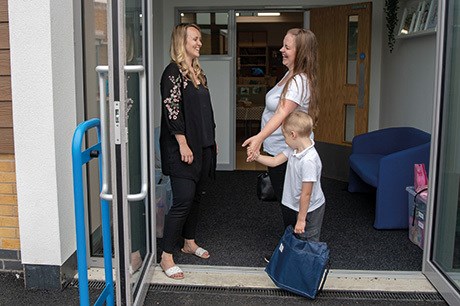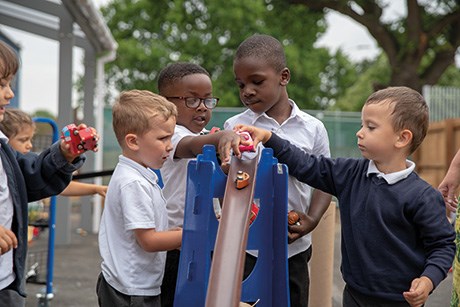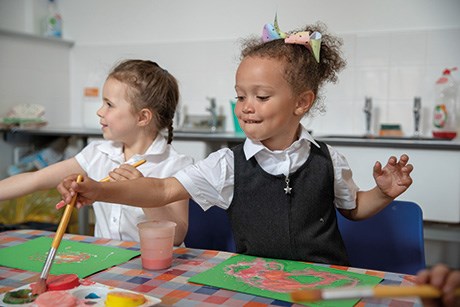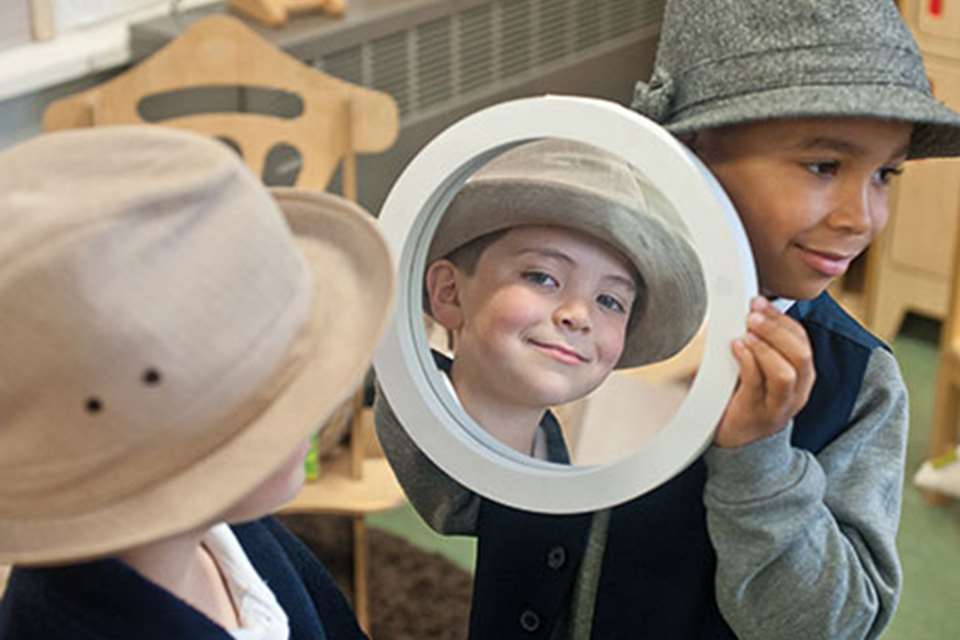EYFS best practice in schools - Happy families?
Annette Rawstrone
Monday, September 16, 2019
Establishing effective relationships with parents is crucial to engaging them in their children’s education. Annette Rawstrone finds out how some schools are doing it

Download the PDF of this article
Gone are the days when parents were expected to leave and collect their children at the school gates. Now schools recognise that working in partnership with parents has a positive impact on children’s well-being and learning – but what does this mean in practice?
For Judith Twani, assistant head teacher at Lakenham Primary School and Nursery in Norwich and early years trainer, this starts with a need for flexibility. ‘There can’t be a one-size-fits-all approach for families,’ she says. ‘Schools should not blame parents for not engaging but look at what they are offering and find out the thing that hooks that parent in and then build a rapport through that. Once the rapport is there, it will help when it’s time to speak about something else.’
She adds it is fundamental to remember that parents are all different and are only human. ‘Be aware of a broad, generic parent label. Our job is to work with the whole family in order for the child to succeed,’ she says. ‘I’ve often heard teachers saying parents don’t care, and that’s an attitude that needs to be challenged. Parents do care, they just don’t all express it in the same way.
‘They are showing trust by bringing their child to school, but may be undergoing stress, have a language barrier, feeling out of their depth – we don’t know what is going on behind the scenes. Rather than being judgemental, we need to seek to understand what is happening.’
BUILDING RAPPORT
The three-way partnership between staff, children and parents is likely to last for seven years and is most successful if strong links are developed from the start. Ways to build rapport include:
- Home visits before a child starts school – use this opportunity to gain insight into the family’s home life and culture, including finding out preferred names and how to pronounce them correctly.
- Sending welcome letters including photographs of key staff members – specific class teacher, senior leadership team (SLT) and pastoral team.
- Holding a welcome meeting, including introducing parents to pastoral support so that their first encounter with them is not negative.
- Encouraging early years parents to bring children into the classroom to register them.
- Ensuring the School Leadership Team (SLT) is visible in the playground each day to greet and chat with parents.
- Providing relaxed opportunities to talk, such as coffee mornings or stay-and-play sessions.
'Informal chats are really valuable because parents are more relaxed so may mention things that are worrying them which can then be followed up. It’s all about putting parents at ease,’ says Ms Twani. ‘I’m also a strong believer in allowing parents into the classroom. They can see the learning space – the sand, water, playdough – which cuts out the mystery and enables them to emulate it at home, which is key.’
Encourage parents to make an appointment with the class teacher or SLT at the school office if there is a more detailed problem or issue that they would like to address. They can then be listened to properly. Remember to follow up anything discussed in a timely manner.
Good communication (see box) is critical to keeping parents informed and engaged, but Ms Twani acknowledges that it is a ‘constant challenge’.
‘You can do it as effectively as possible and there will always be someone who says they didn’t get the email or see the poster in the window,’ she says. ‘Above all, staff need to be warm and to smile. This may sound simple, but it allows parents to know they are accepted.’
CASE STUDIES
Engaging ‘hard to reach’ and vulnerable parents: Broadford Primary School in Romford, Essex

‘We have lots of “hard to reach” parents, so building relationships is something that we work hard at. The majority had poor education experiences themselves and don’t have a positive view of school – there’s the fear factor,’ says Lois Nicholls, head teacher of the three-form-entry school attended by more than 700 children.
‘We’ve had to think of different ways to engage parents with their children’s education. So, instead of holding formal meetings for new families where they sit in rows, are given lots of information and are talked at, we have stay-and-play sessions where they can explore the environment more informally, which is less threatening.’
Rather than holding teacher-led curriculum workshops, staff have found that parents prefer to learn alongside their children, so they invite them to regular stay-and-play sessions in the early years and stay-and-learn sessions in KS1 and KS2.
‘A lot of parents have mentioned that they did not complete secondary school, have poor literacy skills and found school hard. The sessions are so beneficial because we can model to them how to read with their children or help practise their mental maths. It gives parents the skills and confidence to support their children at home,’ explains Ms Nicholls.
‘With high numbers of Pupil Premium, we have a lot of vulnerable families. Staff have specific training on how to speak to vulnerable parents and build relationships, including focusing on positive news to help build trust. We try to have awareness of parents who are dealing with trauma, domestic violence or substance abuse so staff are tooled up to support the families.’
Members of the SLT are on entrance duty in the morning so they can get to know parents. ‘We try to learn all the children’s names so that we can personally greet them in the morning. Parents appreciate this because it shows that we are interested in their child, which indicates that we want to get to know them as well,’ says Ms Nicholls. ‘New parents often avoid eye contact with me, but after a while they start to feel more comfortable and engage in everyday conversations.’
Staff, parents and children all sign a basic home/school agreement with three values. Parents state that they will:
- ensure their children attend every day and are on time
- help children to do their homework
- model the kindness and politeness that is expected of the children.
‘There are times when parents come to us feeling cross and frustrated and speak to staff in an inappropriate, aggressive way – so we can remind them of this agreement,’ says Ms Nicholls.
Written communication is kept brief and informal so it is accessible to those with poor literacy skills. ‘We use a lot of social media to communicate, from Google forms to the school website and Facebook, because we find that letters in book bags are often unread, whereas everyone checks their mobile, so we get more engagement,’ adds Ms Nicholls.
‘We invite parents to sharing assemblies, Christmas productions and end-of-year celebrations. We want parents to start thinking of school in a positive light so that it will rub off on their children. We are trying to break a cycle here and put as much aspiration into parents and children as we can.’

Engaging culturally diverse parents: Redriff Primary School in Rotherhithe, south east London
‘Where the world comes to learn’ is the proud statement on Redriff’s website. The school is attended by 560 children who have 63 different home languages. Staff aim to celebrate and embrace the school’s wide cultural diversity.
‘We want to ensure that everyone feels included and part of the Redriff community regardless of language or background,’ says deputy head teacher Joanna James. ‘Building good relationships with parents is essential to our success as a school. Parent engagement in the educational development of their children improves attainment more than any other factor, and it’s for this reason that a collaborative approach is so important to us.’
Different cultures are reflected throughout Redriff – from family photographs to multi-cultural resources, books and displays that celebrate the school’s diversity. Parents are invited to share their culture, with involvement including reading in their home languages, demonstrating calligraphy and crafts for Chinese New Year and bringing in traditional food to celebrate Eid.
The school hall is always packed for the annual Black History Night, with people wearing their traditional dress, including the executive head in his kilt. Families joining the school from other countries are introduced to others who speak the same language, and members of the newly established PTA have listed the languages they speak so that they are approachable.
New families are visited at home by their child’s teacher so they can start to build a relationship with parents in a familiar environment. During this time, staff start to learn about the family’s structure, culture and what is important to them.
‘We aim to welcome parents into the community as soon as their child begins their school life. It’s important to forge these relationships quickly because harder-to-reach parents become more difficult to engage as their children get older,’ says Ms James. ‘The school leadership team is visible and accessible. We are always available to meet and we are present in the playground each morning.’
The school’s Family Liaison team works to support the whole family and break down any barriers they may face, as well as running well-attended programmes such as Parent Gym.
Redriff is part of the Achievement For All programme, aimed at improving outcomes for under-achieving pupils. As part of this, teachers meet with targeted children’s parents to involve them in both school and home targets. All parents are invited to curriculum workshops and termly parent-teacher meetings to discuss their child’s progress.
Weekly school newsletters and regular Twitter updates have an emphasis on photographs to visually illustrate the varied activities that take place at the school, and parents are invited to watch class assemblies to celebrate their children’s learning. Parents’ views are also sought through surveys, with parents commenting on the positive inclusion of all faiths and the ‘sense of “belonging” in a friendly and caring community’.
Engaging new parents: Robin Hood Primary School in Kingston Vale, Greater London
‘We need to establish good relationships with parents even before their children start at school in order to attract them in. Word of mouth from existing parents helps, but it’s a competitive market and we’re not surrounded by young families, so we advertise on the side of buses, the local radio and on banners inviting parents into the school,’ says head teacher Pete Boulton, who personally shows prospective parents around.
‘Selling points are that we’re a small school – one form entry with 225 children including the nursery – so small class sizes. Our size means that we know our families really well. Caring and nurturing is a big part of what our stable staff team does,’ he adds.
Staff conduct home visits for new families to begin building relationships and gather an insight into family life, to gain an idea of what support they may need. This knowledge is built on at the welcome meeting, where it is emphasised that staff, parents and children are all working together, and continued through the year via informal chats with parents at drop-off and pick-up times, along with holding class assemblies and parent evenings to discuss and celebrate progress.
There is a staggered entry system which can be extended if a child is unhappy. ‘It’s often parents who have not had their children in childcare who are more apprehensive,’ says Mr Boulton. ‘We talk to them to gain their trust and reassure them that we will look after their child in all aspects, not just their education. We work with parents to ensure we’re using the same positive language, such as reassuring their child that they will have a brilliant day and they will collect them later.’
As a parent, Mr Boulton understands the pressures of family life. He is careful to ensure parents are given plenty of notice of events, such as dressing-up days, and has recently reviewed home learning to reduce the amount given but improve the quality of interactions.
‘We ask parents to read for at least 15 minutes with their children every day and have introduced talking homework – parents having engaging conversations with their children, rather than filling out worksheets, is critical,’ he explains. ‘We’ll tell parents their children have been learning about the Three Little Pigs and suggest key questions they can ask to engage them both in the learning. Children can then be more passionate about what they’ve learned, rather than being asked “How was your day?”, which can be too broad.’
CASE STUDY: engaging working and isolated parents

Lairhillock Primary School in Netherley, Aberdeenshire is in an affluent but rural area with many professional parents, some working offshore in the oil industry. The majority of the school’s 150 children are transported by school bus, reducing the opportunity for direct contact with parents.
‘Parents are the single most important influence on their children’s development, learning and achievement, so we work at building informal relationships with parents from when they come to look around the school,’ says head teacher Christeen Saward.
‘We then have termly key worker meetings so that staff can get to know the child and family, and we hold regular stay-and-play sessions so parents can meet the staff, see what their child is doing and how they are interacting with others. Establishing relationships makes it easier if a teacher or parent needs to raise a difficult issue, and they are more likely to accept support.’
Engaging with working parents can be difficult, but Mrs Saward finds that holding events involving their children – such as class assemblies, performances and open classroom days – can encourage busy parents over the threshold. Workshops and parent-teacher meetings are held both during and after school hours.
Communicating with parents through email and Seesaw, an online platform, is invaluable. Children are encouraged to upload work to share with their family, and staff also share observations and news. This is particularly appreciated by parents who are working away and those who do not have family nearby, enabling them to be included in school life. ‘Parents can see what their children are doing and use it as a talking point to engage with their learning,’ says Mrs Saward.
Parents are encouraged to volunteer at the school and share their skills – from helping in the library to holding baking and gardening sessions or speaking to pupils about their work. ‘From getting to know parents we can tap into the skills they have and are very lucky with the wealth of help we receive,’ says Ms Saward.
A parent has agreed to organise monthly coffee-and-chat sessions at the school for nursery parents. ‘It’s hard to meet others when you live in the middle of nowhere, which can lead to families feeling isolated. Mental health among adults is a major concern in Aberdeenshire and having a child is hard work, especially for those living away from their families,’ says Mrs Saward.
‘These sessions help parents to form relationships with others, which must be wonderful for them emotionally. Building a whole-school community is important for everyone’s well-being.’
TIPS: WORKING WITH PARENTS
School community
Help parents feel part of the whole school community by:
- regular school newsletters
- having a home/school agreement
- keeping the website (which can be translated into other languages) updated
- using social media to report school events
- gathering views and consulting on major changes, whether by a simple flipchart or online questionnaire
- having a Parent Teacher Association (PTA)
- holding whole-school events, such as summer fairs
- signposting parents to others sharing their first language
- inviting them in to share their skills or volunteer – which benefits the school and can also empower parents and raise their aspirations
- having a visually appealing and updated parent noticeboard positioned where parents congregate.
Learning and development
Include parents in their child’s learning through:
- termly newsletters detailing what their child’s class will be investigating
- regular parent and teacher meetings
- inviting them to look at their child’s work
- online learning journals
- curriculum workshops or in-class sessions
- celebratory family assemblies.
Monitor which parents are not attending these events and try to invite them personally to future ones, or find another way to accommodate them, such as changing timings.










